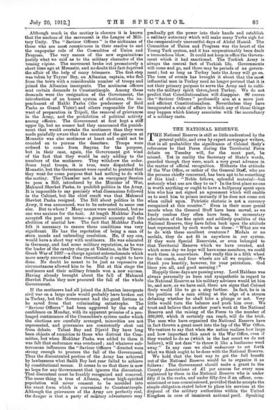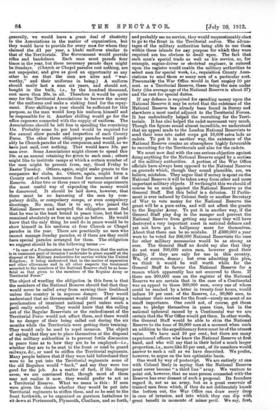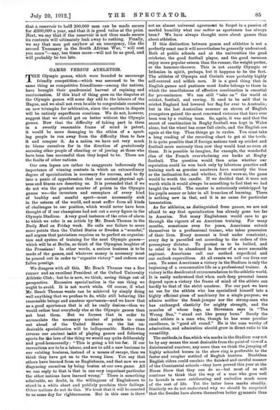THE NATIONAL RESERVE. T HE National Reserve is still so little
understood by the general public, and even by expert newspaper writers, that in all probability the significance of Colonel Seely's references to that Force during the Territorial Force debate on Tuesday will, for the most part, be missed. Yet in reality the Secretary of State's words, guarded though they were, mark a very great advance in the matter of official recognition. Hitherto the attitude of the War Office, or rather of the General Staff, who are the persons chiefly concerned, has been apt to be something of this kind : "Noble fellows, splendid material—but seriously what use are they to us ? In the first place no one is worth anything or ought to have a halfpenny spent upon him who has not signed an agreement which will enable us to send him to prison instantly if he does not come out when called upon. Patriotic rhetoric is not a currency recognized at this counter." Even in their more genial moods when the General Staff have been moved, as we freely confess they often have been, to momentary admiration of the fine spirit and soldierly qualities of the National Reserve, they have fallen back upon the attitude best represented by such words as these : "What are we to do with these excellent creatures ? Medals or no medals, they do not fit in anywhere in our system. If they were Special Reservists, or even belonged to that Territorial Reserve which we have created, and. which some day we hope will have some members, we could work them in somewhere. But really this is a fifth wheel for the coach, and four wheels are all we require.—We thank you heartily, however, for your patriotism. God bless you all, and good. morning I" Happily these days are passing away. Lord Haldane was always personally as keen and sympathetic in regard. to the National Reserve as his military advisers would. let him be, and. now, as we have said, there are signs that Colonel Seely would like to go a step further. In fact, he is in the position of a man sitting at the edge of a, stream debating whether he shall take a plunge or not. Very little would turn the balance and push him over. We trust and believe that another year's work at the National Reserve and the raising of the Force to the number of 300,000, which it certainly can reach, will do the trick. The men who have organized the National Reserve have in fact thrown a great asset into the lap of the War Office.- We venture to say that when bile nation realizes how large and. how important this asset is the War Office, even if they wanted. to do so (which in the last resort we do not believe), will not dare "to throw it like a loathsome weed away." In any case we shall endeavour to set forth what we think ought to be done with the National Reserve. We hold that the best way to get the full benefit out of the National Reserve would be to organize it as follows : The Government should make a grant to the County Associations of £1 per annum for every man registered by them in the National Reserve who is under fifty if in the ranks, and under fifty-five if an officer, com- missioned or non-commissioned, provided that he accepts the simple obligation stated below to place his services at the disposal of the military authorities within the United. -Kingdom in case of imminent national peril. Speaking generally, we would leave a great deal of elasticity to the Associations in the matter of organization, but they would have to provide for every man for whom they claimed the £1 per year, a khaki uniform similar to that of the Territorials. The Government would provide rifles and bandoleers. Each man must parade four times in the year, but these necessary parade days might be Sundays. (Church or Chapel parades cost nothing, are not unpopular, and give as good an opportunity as any other to see that the men are alive and "war- worthy," and their uniforms in being.) A uniform should easily last a man six years, and should not, bought in the bulk, i.e., by the hundred thousand, cost more than 20s. in all. Therefore it would be quite easy for the Territorial Associations to borrow the money for the uniforms and make a sinking fund for the repay- ment. Four shillings a year should be sufficient for this purpose, as the man would keep his uniform himself and be responsible for it. Another shilling would go for the office expenses connected with the supply of uniform. The Associations should be left free in spending the remaining 15s. Probably some 5s. per head would be required for the annual show parade and inspection of each County Force. The other three obligatory parades would prob- ably be Church parades of the companies, and would, as we have just said, cost nothing. That would leave 10s. per man over. Some Associations might choose to spend this 10s. as an annual retaining fee given to each man ; others might like to institute camps at which a certain number of the men might be present from, say, Good Friday to Easter Tuesday. Others, again, might make grants to the companies far clubs, &c. Others, again, might form a County out-of-work insurance fund for members of the Reserve. After two or three years of various experiments the most useful way of expending the money would be discovered. It should be laid down, however, that there must be no harassing of the men by com- pulsory drills, or compulsory camps, or even compulsory shootings. No man, that is to say, who joined the National Reserve and accepted the obligation must feel that he was in the least bound in peace time, but that he remained absolutely as free an agent as before. He would know that the only thing he need do in peace would be to show himself in his uniform at four Church or Chapel parades in the year. There are practically no men who cannot manage Sunday parades, or if there are they could have special parades arranged for them. The obligation we suggest should be in the following terms :— " In case of a Proclamation issued by the Crown that the nation is in imminent peril of invasion I undertake to place myself at the disposal of the Military Authorities for service within the United Kingdom; it being understood that in the matter of separation and other allowances and in all other respects the treatment accorded to the members of the National Reserve shall be as bene- ficial as that given to the members of the Regular Army or Territorial Force."
The object of wording the obligation in this form is that the members of the National Reserve should feel that they would never be called away from earning their livelihood unless the country is in supreme danger. They would understand that no Government would dream of issuing a proclamation of imminent national peril unless such a peril really existed. They would know that the calling out of the Regular Reservists or the embodiment of the Territorial Force would not affect them, and there would be no danger of their being called out during the six months while the Territorials were getting their training. They would only be used to repel invasion. The object of saying that they are to place themselves at the disposal of the military authorities is to prevent futile discussion in peace time as to how they are to be employed—i.e., whether they are to be sent to the front or used to guard railways, &c., or used to stiffen the Territorial regiments. Many people believe that if they were told beforehand they were to be put into the Territorial regiments some of the old Regulars would "buck," and say they were too good for the job. As a matter of fact, if the danger arose, we are convinced that, though most of them may not realize it now, they would prefer to act as a Territorial Reserve. What we mean is this : If men were given the choice whether they would be put into Territorial regiments to stiffen them, and so be sent to the front forthwith, or be organized as garrison battalions to sit down at Portsmouth, Plymouth, Chatham, and so forth, and probably see no service, they would unquestionably elect to go to the front in the Territorial cadres. The advan- tages of the military authorities being able to use them within these islands for any purpose for which they were required are too obvious to dwell upon. The fact that each man's special trade as well as his service, as, for example, engine-driver or electrical engineer, is entered upon the register would enable the military authorities to select men for special work, i.e., requisition County Asso- ciations to send them so many men of a particular sort. Presumabiy the War Office would in fact employ 60 per cent. as a Territorial Reserve, those being the men under forty (the average age of the National Reserve is about 37) and the rest for special duties.
If any defence is required for spending money upon the National Reserve it may be noted that the existence of the National Reserve hes already been found in Surrey and elsewhere a most useful adjunct to the Territorial Forces. It has undoubtedly helped the recruiting for the Terri- torials. It has also helped the cadet movement very much. Though the figures sound almost incredible, we understand that an appeal made to the London National Reservists to send their sons into cadet corps got 10,000 extra lads as cadets. To put it in another way, the existence of the National Reserve creates an atmosphere highly favourable to recruiting for the Territorials and also for the cadets.
We must now deal with the one serious objection against doing anything for the National Reserve urged by a section of the military authorities. A portion of the War Office officials have always been opposed to the National Reserve on grounds which, though they sound plausible, are, we believe, mistaken. They argue that if money is spent on the National Reserve it will be taken away from other and more important military objects. If we thought this we should of course be as much against the National Reserve as the General Staff. But this belief is a delusion. If Parlia- ment is ever induced by Colonel Seely or another Secretary of War to vote money for the National Reserve the grant will be a pure extra, and will not affect the grants to the Regular Army. To put it in another way, if the General Staff play dog in the manger and prevent the National Reserve from getting any money they will have destroyed a very important asset in national defence and. yet not have got a halfpenny more for themselves. About that there can be no mistake. If £300,000 a year were to be voted for 300,000 National Reservists the case for other military necessaries would be as strong as ever. The General Staff no doubt say also that they do not want 300,000 extra men, however good their quality, if they are only for use in this country. We, of course, demur ; but even admitting this plea, we think it would be well worth while for the General Staff to favour the National Reserve for a reason which apparently has not occurred to them. If there are 300,000 men on the register of the National Reserve we are certain that in the case of a Continental war an appeal to those 300,000 men, every one of whom could be reached by a letter in twenty-four hours, would induce 10 per cent. of the Reserve, i.e., 30,000 men, to volunteer their services for the front—surely an asset of no small importance. One could not, of course, get these men to pledge themselves in peace time, but in the national upheaval caused by a Continental war we are certain that the War Office would get them. In other words, the General Staff would be able to skim the National Reserve to the tune of 30,000 men at a moment when such an addition to the expeditionary force must be of the utmost value. We have said 10 per cent., but there are many experienced officers who know the National Reserve at first hand, and who will say that in their belief a much larger proportion, i.e., more like 25 per cent., of its members would. answer to such a call as we have described. We prefer, however, to argue on the less optimistic basis.
One word by way of postscript. We are entirely at one with Colonel Seely in saying that the National Reserve must never become "a third line" army. We venture to point out, however, that no sane person connected with-the Reserve has ever dreamt of such a proposal. Its founders regard it, not as an army, but as a great reservoir of trained men from which, if they do not deliberately knock the bottom out, the War Office can draw every drop in case of invasion, and into which they can dip with great benefit in moments of minor peril. We say, first, that a reservoir to bold 300,000 men can be made secure for £300,000 a year, and that it is good value at the price. Next, we say that if the reservoir is not thus made secure its contents will ultimately leak away to nothing. Finally, we say that men got anyhow at an emergency, like the second Yeomanry in the South African War, " will cost you more "—nay, ten times more—will not be as good, and will probably be too late.








































 Previous page
Previous page